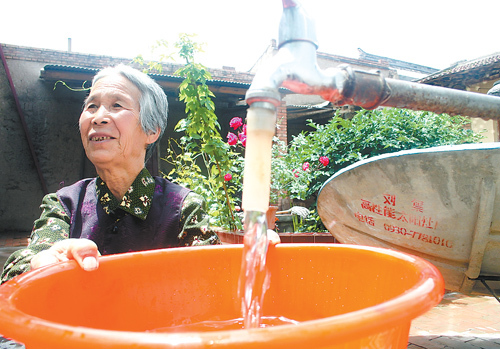China has set sights on cleaning up its vast rural regions.
The Ministry of Environmental Protection (MEP) initiated a special fund to fight rural environment problems, such as pollution of drinking water sources, last November.
 |
|
The file photo shows Ran Yulian, a villager in Linxia County, northwest China's Gansu Province, is happy to see fresh, safe tap water has been accessible to her home. The Ministry of Environmental Protection initiated a special fund to fight rural environment problems, such as pollution of drinking water sources, in November, 2009. |
The country is determined to increase its financial and technology support for environmental protection in the coming years, according to Zhuang Guotai, director of nature and ecological protection department under the MEP.
The central government's fund amounts to 500 million yuan and will be used to improve the environment in about 700 villages where over 4 million rural people live, according to the MEP.
But China has more than 700,000 villages and some 30 million of its rural residents still have no access to clean drinking water.
So in the coming years, the central government will increase the fund and will offer economic incentives to encourage local governments to curb rural pollution.
"This year's budget is still waiting for approval from the cabinet but it will definitely be much larger than the previous year," Zhuang said at a conference on rural environmental protection held recently in Beijing.
The fund will give priority to villages downstream of the Huaihe, Haihe, Liaohe and Songhua rivers, Taihu and Dianchi lake and the Three Gorges Reservoir. The money will be used to address environmental problems such as the pollution from household sewage, livestock and poultry, as well as problems created by deserted mining sites.
The aim is to curb pollution in these villages by 2015 and build up a sound environment monitoring and management system in rural areas.
Last year's national environmental statistics, which were released in an annual MEP report on June 5, World Environment Day, indicate that the environment in rural areas is "deteriorating."
Rural environmental problems are a major obstacle for the country to realize its goal of a "harmonious society", Zhuang said.
"A large portion of the complaints for environmental problems and disputes MEP has received come from rural regions," Zhuang said.
The deteriorating environment in the countryside not only is a problem for rural people but also threatens urban residents, since the country's rural areas provide a huge amount of the food products consumed in big cities, said Zhuang.
According to Wu Xiaoqing, vice minister of MEP, every year, a total of 280 million tons of household garbage, 9 billion tons of household sewage and 260 million tons of human excrement are generated in China, with most of it dispersed on site, mostly because of a lack of sufficient infrastructure.
The government held its first national meeting on rural environmental protection last July and set targets of a 10 percent increase sewage and consumer waste treatment capacity and a similar increase in its livestock and poultry waste utilization rate by 2010.
Pollution from agricultural activity is the major cause for rural environmental deterioration, said Zhang Yongtai, an environmental expert from Nanjing Institute of Environmental Science.
Almost 70 percent of fertilizer and pesticide used in China gets swept off by rainfall and ends up either in lakes, where it causes algae blooms, or in ground water.
Pollution from livestock breeding is also a huge problem. Some 2.7 billion tons of livestock excrement is generated annually in China but only 20 percent of rural breeding farms have adequate treatment facilities to deal with it.
Most current techniques that have proved successful in treating industrial and urban pollution are not feasible in the rural areas, said Zhang.
"Centralized sewage treatment plants in the cities, for instance, cannot simply be copied to deal with waste water in the rural areas, since houses are scattered, making it difficult to collect the sewage," said Zhang.
Zhang said techniques to control rural pollution need to be practical and inexpensive.
Household methane facilities, for instance, can easily convert livestock's excrement into biogas, which could be used for cooking or heating, said Zhang.
(China Daily April 13, 2009)